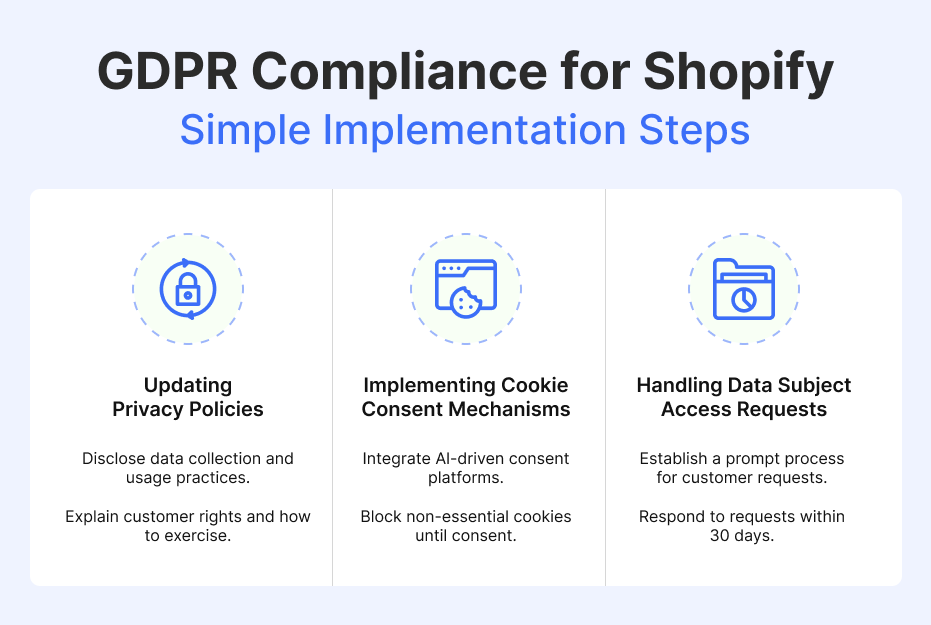Are you confident your Shopify store can survive a GDPR audit in 2025? With regulators increasing enforcement and consumers demanding more transparency, compliance is no longer just for EU-based businesses—it’s for everyone selling online.
In 2024, the EU issued over €2.1 billion in GDPR fines, many aimed at e-commerce businesses handling customer data irresponsibly. These breaches damaged brand reputation, reduced trust, and exposed major privacy flaws that merchants failed to address.
This blog covers key compliance strategies—keep reading to discover actionable insights for your Shopify store.
The General Data Protection Regulation (GDPR) is a European law designed to protect the personal data of EU citizens. It mandates businesses, including Shopify stores, to handle customer data transparently, securely, and only with clear consent.
GDPR applies to any business processing EU residents’ data, making GDPR compliance essential for Shopify stores. Non-compliance risks heavy fines and damages customer trust, so Shopify merchants must align with these regulations regardless of their location.
Even Shopify stores outside the EU must comply with GDPR when handling EU customer data. This includes collecting emails, tracking behaviour with cookies, or offering services to EU residents.
Shopify merchants need to implement robust Shopify privacy compliance practices, including privacy policies and cookie consent mechanisms, to meet GDPR demands and build user trust.
In 2025, GDPR enforcement has intensified, emphasising the need for explicit and informed user consent before collecting personal data. Shopify merchants must implement clear cookie consent banners and opt-in mechanisms to comply with these requirements.
Customers have the right to access, rectify, erase, and port their personal data. Shopify is now expected to provide improved tools that help merchants respond swiftly to data subject requests under the 2025 GDPR standards.
Regulatory authorities have become more vigilant, imposing significant fines for GDPR violations. Ensuring compliance is not just about avoiding GDPR penalties but also about maintaining customer trust and brand integrity.

Shopify merchants must update their privacy policies to reflect their actual data collection and usage practices. This includes disclosing what data is collected, how it’s used, who it’s shared with, and how long it is retained.
The policy should also explain customer rights and how to exercise them. Use Shopify’s templates as a base but customise them for accuracy and completeness.
Instead of relying solely on Shopify’s basic cookie banner, merchants should integrate consent management platforms like Seers AI, a powerful AI-driven consent management solution. It ensures GDPR compliance by blocking non-essential cookies until consent is given, recording consent logs, and auto-updating policies as needed.
Seers AI helps create transparent user experiences and builds compliance seamlessly into your store’s operations.
Shopify provides tools that allow customers to access, correct, or delete their personal data. Merchants must establish a clear and prompt process to act on these requests.
Use Shopify’s features to export or delete data as required, and ensure you respond to requests within the GDPR’s 30-day window.
Shopify’s Data Processing Addendum (DPA) outlines the responsibilities between merchants and Shopify regarding data handling. Merchants should review and accept the DPA within their Shopify admin settings to ensure compliance.
The DPA also ensures that Shopify processes data only on the merchant’s documented instructions, reinforcing GDPR principles of accountability and transparency.
Shopify allows merchants to configure customer privacy settings, including cookie banners and data sales opt-out pages. These settings enhance transparency and give users control over their data.
By enabling these settings, merchants can offer region-specific privacy notices and consent options, allowing better compliance with GDPR and building deeper trust with users.
To stay compliant, Shopify merchants should consistently review key operational checkpoints:
Routine auditing ensures your store remains aligned with GDPR expectations and avoids preventable lapses.
Keep your team equipped with essential GDPR knowledge and responsibilities:
Well-trained employees are vital to maintaining a culture of privacy and trust across your Shopify operations.
Seers AI offers a concise online GDPR staff training that takes less than an hour. It’s perfect for equipping your team with essential compliance knowledge and avoiding costly regulatory risks.
Train Your Team
Review third-party apps for GDPR compliance. Ensure that apps handle customer data securely and transparently. Shopify requires all third-party apps to make their data collection policies public.
GDPR compliance is more than a legal necessity, it’s a powerful way to build customer trust. Transparent data practices reassure shoppers that their information is safe. It encourages repeat business opportunities and positive reviews.
Shoppers today value privacy. By respecting their data rights and providing clear consent options, your Shopify store creates a loyal customer base that feels respected and valued. It increases brand loyalty and adds a lifetime value.
Embracing GDPR compliance can also set your store apart from competitor stores. Privacy-focused customers are more likely to choose businesses that protect their data, turning compliance into a competitive advantage and driving sustainable growth.
Today, GDPR compliance for Shopify stores isn’t just a legal obligation, it’s a critical factor in building customer trust and securing your business’s future. By staying proactive with clear privacy policies, proper consent management, and vigilant data handling, you not only avoid hefty fines but also create a transparent and trustworthy shopping experience. Remember, protecting customer data is protecting your brand’s reputation.
Seers AI makes GDPR compliance effortless with smart, AI-driven consent management solutions. Flexible pricing plans let you choose what fits best. Secure your store, build trust, and grow your Shopify business today.
Start NowGet Free Shopify PluginShopify provides built-in GDPR features to help EU stores comply, including privacy policy templates, data processing agreements, cookie banners, and customer privacy controls. Shopify acts as a data processor and enables merchants to meet GDPR obligations effectively.
Shopify implements strict data security measures and offers tools to manage customer consent and data access requests. Shopify’s GDPR framework ensures merchants can collect, store, and process customer data transparently and securely in line with regulations.
Shopify store owners must implement clear cookie consent banners that require explicit opt-in before placing non-essential cookies. Using consent management tools ensures users can accept or reject cookies, aligning with GDPR’s strict consent requirements and enhancing transparency.
Shopify merchants should have processes in place for handling data subject access requests, including data access, correction, deletion, and portability. Shopify offers built-in tools to assist with these requests, helping merchants respond within GDPR’s 30-day timeframe.
Not all third-party Shopify apps are automatically GDPR compliant. Merchants must review app privacy policies and data handling practices to ensure compliance. Using apps that explicitly state GDPR compliance helps maintain overall store data privacy integrity.
Non-compliance can result in fines up to €20 million or 4% of global turnover, whichever is higher. Beyond fines, merchants risk loss of customer trust and damage to brand reputation, making proactive GDPR compliance essential for Shopify stores.
 Rimsha Zafar
Rimsha ZafarRimsha is a Senior Content Writer at Seers AI with over 5 years of experience in advanced technologies and AI-driven tools. Her expertise as a research analyst shapes clear, thoughtful insights into responsible data use, trust, and future-facing technologies.


United Kingdom
24 Holborn Viaduct
London, EC1A 2BN
Get our monthly newsletter with insightful blogs and industry news
By clicking “Subcribe” I agree Terms and Conditions

Seers Group © 2025 All Rights Reserved
Terms of use | Privacy policy | Cookie Policy | Sitemap | Do Not Sell or Share My Personal Information.